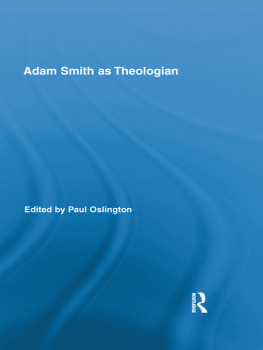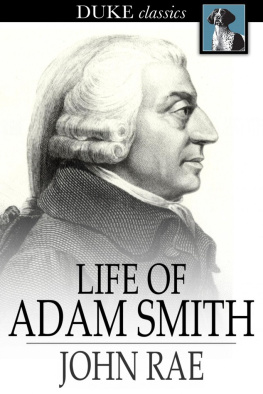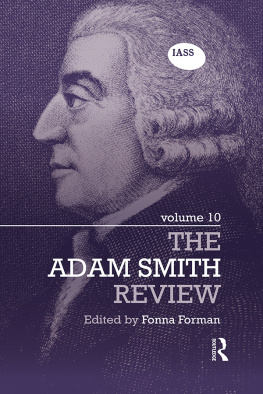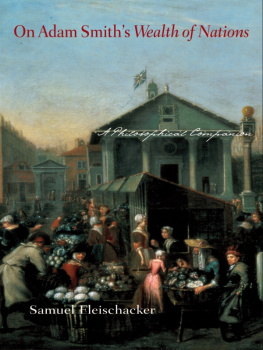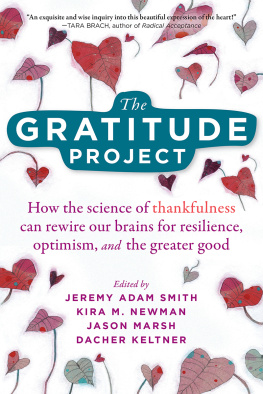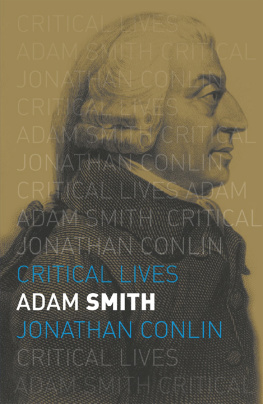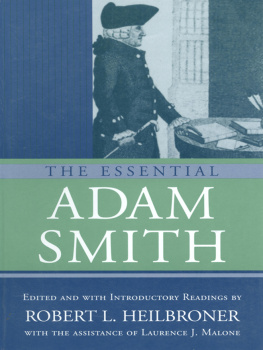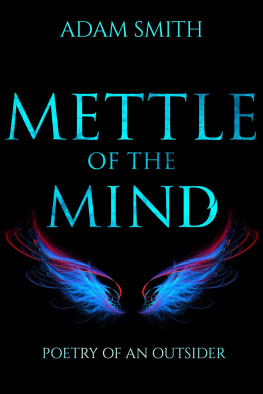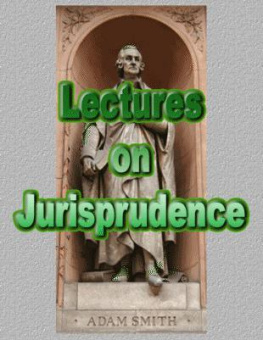Oslington Paul - Adam Smith as Theologian
Here you can read online Oslington Paul - Adam Smith as Theologian full text of the book (entire story) in english for free. Download pdf and epub, get meaning, cover and reviews about this ebook. City: New York, year: 2014, publisher: Routledge;Taylor et Francis, genre: Religion. Description of the work, (preface) as well as reviews are available. Best literature library LitArk.com created for fans of good reading and offers a wide selection of genres:
Romance novel
Science fiction
Adventure
Detective
Science
History
Home and family
Prose
Art
Politics
Computer
Non-fiction
Religion
Business
Children
Humor
Choose a favorite category and find really read worthwhile books. Enjoy immersion in the world of imagination, feel the emotions of the characters or learn something new for yourself, make an fascinating discovery.
- Book:Adam Smith as Theologian
- Author:
- Publisher:Routledge;Taylor et Francis
- Genre:
- Year:2014
- City:New York
- Rating:4 / 5
- Favourites:Add to favourites
- Your mark:
- 80
- 1
- 2
- 3
- 4
- 5
Adam Smith as Theologian: summary, description and annotation
We offer to read an annotation, description, summary or preface (depends on what the author of the book "Adam Smith as Theologian" wrote himself). If you haven't found the necessary information about the book — write in the comments, we will try to find it.
Adam Smith as Theologian — read online for free the complete book (whole text) full work
Below is the text of the book, divided by pages. System saving the place of the last page read, allows you to conveniently read the book "Adam Smith as Theologian" online for free, without having to search again every time where you left off. Put a bookmark, and you can go to the page where you finished reading at any time.
Font size:
Interval:
Bookmark:

| 1. Judaism and Collective Life Self and Community in the Religious Kibbutz Aryei Fishman | 10. Religion, Language, and Power Edited by Nile Green and Mary Searle-Chatterjee |
| 2. Foucault, Christianity and Interfaith Dialogue Henrique Pinto | 11. Shared Idioms, Sacred Symbols, and the Articulation of Identities in South Asia Edited by Kelly Pemberton and Michael Nijhawan |
| 3. Religious Conversion and Identity The Semiotic Analysis of Texts Massimo Leone | 12. Theology, Creation, and Environmental Ethics From Creatio Ex Nihilo to Terra Nullius Whitney Bauman |
| 4. Language, Desire, and Theology A Genealogy of the Will to Speak Nolle Vahanian | 13. Material Religion and Popular Culture E. Frances King |
| 5. Metaphysics and Transcendence Arthur Gibson | 14. Adam Smith as Theologian Edited by Paul Oslington |
| 6. Sufism and Deconstruction A Comparative Study of Derrida and Ibn Arabi Ian Almond | |
| 7. Christianity, Tolerance and Pluralism A Theological Engagement with Isaiah Berlins Social Theory Michael Jinkins | |
| 8. Negative Theology and Modern French Philosophy Arthur Bradley | |
| 9. Law and Religion Edited by Peter Radan, Denise Meyerson and Rosalind F. Atherton |

First published 2011
by Routledge
270 Madison Avenue, New York, NY 10016
Simultaneously published in the UK
by Routledge
2 Park Square, Milton Park, Abingdon, Oxon OX14 4RN
Routledge is an imprint of the Taylor & Francis Group, an informa business
2011 Taylor & Francis
The right of the editor to be identified as the author of the editorial material, and of the authors for their individual chapters, has been asserted in accordance with sections 77 and 78 of the Copyright, Designs and Patents Act 1988.
Printed and bound in the United States of America on acid-free paper by IBT Global.
All rights reserved. No part of this book may be reprinted or reproduced or utilised in any form or by any electronic, mechanical, or other means, now known or hereafter invented, including photocopying and recording, or in any information storage or retrieval system, without permission in writing from the publishers.
Trademark Notice: Product or corporate names may be trademarks or registered trademarks, and are used only for identification and explanation without intent to infringe.
Library of Congress Cataloging-in-Publication Data
Adam Smith as theologian / edited by Paul Oslington.
p. cm.(Routledge studies in religion ; 14)
Includes bibliographical references and index.
1. Smith, Adam, 1723-1790Religion. I. Oslington, Paul.
B1545.Z7A213 2011
230.092dc22
2010048765
ISBN13: 978-0-415-88071-8 (hbk)
ISBN13: 978-0-203-81641-7 (ebk)
ANTHONY WATERMAN
PAUL OSLINGTON
BENJAMIN M. FRIEDMAN |
JOHN HALDANE |
| Sympathy and Domination: Adam Smith, Happiness and the Virtues of Augustinianism ERIC GREGORY |
| Christian Freedom in Political Economy: The Legacy of John Calvin in the Thought of Adam Smith JOE BLOSSER |
PAUL OSLINGTON |
PETER HARRISON |
JAMES OTTESON |
BRENDAN LONG |
| From Civil to Political Economy: Adam Smiths Theological Debt ADRIAN PABST |
| Man and Society in Adam Smiths Natural Morality: The Impartial Spectator, the Man of System and the Invisible Hand ROSS B. EMMETT |
PAUL S. WILLIAMS |
The charitable reader of this book will forgive the anachronism of its title. Adam Smith was not a theologian. Nor was he an economist. These are present-day labels for present-day intellectual enterprises. There has been much division of labour in the academic industry since Smiths day. The modern university is an ever-expanding pin factory. Though some lines of descent may be traced, there is little resemblance between the kind of work we do now and the kind of work that Adam Smith did at Glasgow in the 1750s, or that William Paley did at Cambridge in the 1760s.
In the 18th century the learned were known as men of letters. Only in the 19th century did the new genus men of science appear. But at least since the Renaissance men of letters had often specialized in either divine letters or humane letters. The former, known in the 18th century as divines, studied the Bible and the Fathers, the history and development of church doctrine, what in the 18th century were known as natural and revealed theology, respectively, and what we might today call philosophical theology and philosophy of religion. The latter, originally known as humanists, studied the literature of classical antiquity, history and philosophyincluding both the natural philosophy of Newton that we now call science, and moral and political philosophy both classical and modern.
Yet even this specialization was never complete, in Britain at any rate, before the mid-19th century. Partly because of the requirements of the university curriculum, which existed both to train the clergy of the national church and to educate the next generation of the ruling class in their responsibilities and duties, academics such as Smith and Paley had to keep a foot in each camp. Though today Paley is remembered chiefly as a divine, his lectures in moral and political philosophy contained matter we can clearly identify as economic analysis and which led Keynes to call him the first of the Cambridge economists. Though Adam Smith is generally thought of as the father of what his English successors called political economy, he lectured at Glasgow on natural theology among other things, and his published works contain much that is now recognized as theologynot to mention ethics, history of science, psychology, linguistics, aesthetics and literary criticism. But in fact both Paley and Smith were regarded, and would have regarded themselves, as philosophers . (Smith was poking gentle fun at himself in admitting that only the vanity of the philosopher prevents him from seeing that in genius and disposition he is not so different from a street porter.) By far the most illustrious philosopher and historian of the present age, Smiths friend David Hume, never held any academic appointment at all, and was therefore unconstrained by curricular requirements. But he made important contributions to what we should today call history, political science, political philosophy, epistemology, metaphysics, ethics, economics and theology.
What is at issue is whyand howwe identify our current intellectual preoccupations with certain elements abstracted from the relatively undifferentiated texture of our predecessors writings. For this is what we are doing when we describe those elements as theology or economics or by the label of any other modern disciplinary category.
When we irreverently set one of our funny, 21st-century hats upon Adam Smiths dignified, 18th-century head, our reasons for doing so, and the way we go about it, will depend very much on just which hat we have in mind. If we are interested in Adam Smith as economist, for example, we shall use present-day theory to identify the analytical content of Wealth of Nations , believing, as Samuelson put it, that within every classical economist there is to be discerned a modern economist trying to be born. Economics is a scientific enterprise: we hope and expect to see the growth of knowledge. Thus we study economic theory in retrospect in order to understand and appraise the extent to which economics knowledge has broadened and deepened since Smiths day.
Font size:
Interval:
Bookmark:
Similar books «Adam Smith as Theologian»
Look at similar books to Adam Smith as Theologian. We have selected literature similar in name and meaning in the hope of providing readers with more options to find new, interesting, not yet read works.
Discussion, reviews of the book Adam Smith as Theologian and just readers' own opinions. Leave your comments, write what you think about the work, its meaning or the main characters. Specify what exactly you liked and what you didn't like, and why you think so.

